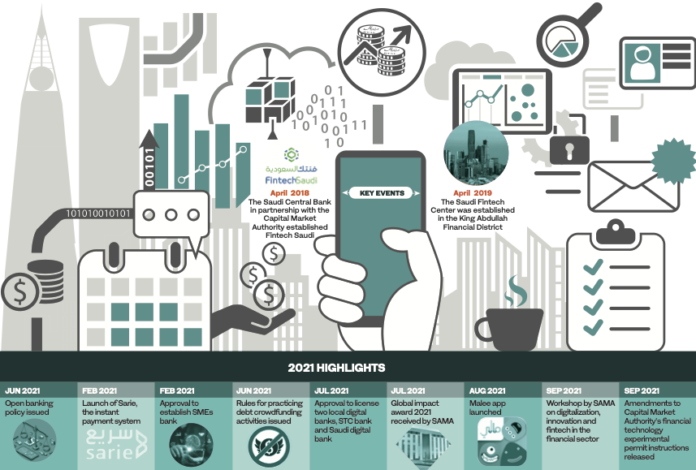RIYADH: Saudi Arabia saw a significant jump in venture capital investments in the financial technology sector, hitting 16 deals in the first eight months of 2021 totaling $157.2 million.
This compares with 2020, when seven venture capital deals were signed worth $7.8 million as pandemic restrictions curtailed activity, according to the annual Saudi Fintech annual report.
This year has also seen backing spread across a range of early-stage projects, with 46 percent at series A and B stages, 38 percent at the seed stage, and 15 percent at pre-seed levels.
Pre-seed funding is the earliest stage of investment, often from founders, family and close supporters. This is followed by more formal seed and series stages, where equity in the business is traded.
This spread of investment demonstrates that backing is available to support fintech companies at key stages of their development.
There has been an increase in the level of early seed-stage and pre-seed stage investment, in particular.
So far in 2021, investors have signed deals worth $12.9 million at seed and pre-seed stage investment, a 108 percent jump from $6.2 million invested in 2020.
The payments sector remains the most attractive fintech area in the Kingdom, so far accounting for around 93% of total venture capital investments this year.
Highlights include series A investments in mobile payments platform Hala $6.5 million and buy-now-pay-later business Tamara $110 million. While restaurant point-of-sale provider Foodics attracted $20 million of series B funding.
Despite growing levels of fintech investment in the Kingdom, the median deal size in Saudi Arabia is $2.7 million compared to a global median deal size of $7.3 million.
The number of financial technology companies in Saudi Arabia continues to grow, as the number of companies increased this year to 82. (Shutterstock)
The launch of Open Banking in Saudi Arabia in 2022, which allows firms to share consumer current account data once permission has been given, is also expected to speed up the pace of fintech development.
Experts expect this move will provide existing fintech investors with more opportunities, and will attract funds to the sector.
The number of financial technology companies in Saudi Arabia continues to grow, as the number of companies increased this year to 82, a 37 percent rise on the previous year.
Commitment to Vision 2030
The move by the Kingdom’s central bank, SAMA, to Open Banking is set to support the further development of the sector, in line with Saudi Vision 2030 and the Financial Sector Development Program, launched in 2017.
The plan includes developing the digital economy, and allowing financial intermediaries to support private sector growth by opening up the financial services industry to new players. It also encourages the building of an advanced capital market in the Kingdom.

